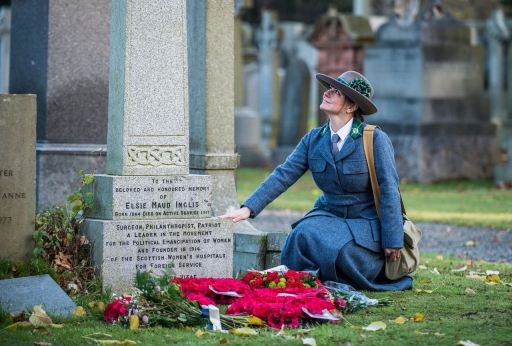Tributes are being paid to Dr Elsie Inglis, founder of the Scottish Women’s Hospitals movement, on the centenary of her death during the First World War.
Dr Inglis, one of the first women in Scotland to qualify as a doctor, defied official disapproval to set up a network of hospitals for soldiers wounded on the battlefields of the Western Front and the Balkans.
Turned away by the British War Office with the words ‘my good lady go home and sit still’, her offer of front line medical help was accepted by France and other Allied countries, notably Serbia where she’s still remembered as ‘the Serbian mother from Scotland.’
Interned
Leading her teams in Serbia, she was interned when the Central Powers invaded in the autumn of 1915.
The Serbian Embassy to the UK was represented at a remembrance service held at Elsie Inglis’s grave in Dean Cemetery, Edinburgh, on November 26, the 100th anniversary of her death on this day in 1917.
Today (November 29), Princess Anne and Scotland’s First Minister Nicola Sturgeon attended a service of thanksgiving for the life and work of Dr Inglis at St Giles Cathedral in the Scottish capital.
The bells tolled to mark the moment her funeral began on this day, 100 years ago.
And at Westminster, the UK Parliament held a debate in recognition of Elsie Inglis’s service and the contribution of women to the war effort in 1914-18.
 Portrait of Dr. Elsie Inglis (Photo: Wellcome Collection)
Portrait of Dr. Elsie Inglis (Photo: Wellcome Collection)
Tributes were paid to Elsie Inglis’ achievements as a doctor and campaigner for women’s rights, before and during the First World War.
A supporter of the struggle for the vote, she saw the war as an opportunity for women to demonstrate their capabilities. Undaunted by her rebuff from the War Office, she set up 17 hospitals for soldiers, staffed mostly by women, in France, Corsica, Greece, Macedonia, Romania and Serbia.
In today’s money, the equivalent of more than £50 million was raised to fund the operation, with help from the suffragist movement.
Decorated
Dr Elsie Inglis was interned during the German-led occupation of Serbia, before being sent home. In April 1916, she became to first woman to be awarded Serbia’s Order of the White Eagle.
But she did not live to see the peace of 1918, the granting of the first votes to British women that year, or the birth of independent Yugoslavia.
Suffering from cancer, Dr Inglis continued with her work in Romania in 1917, dying on November 26, a day after returning to the UK.
Family members have reflected on her remarkable life at this week’s Centenary commemorations in Edinburgh.
Clea Thompson, a great great great niece, said: “Elsie worked relentlessly with fortitude in highly traumatic circumstances to save lives throughout her life. It is very meaningful to me personally and, as I continue to learn more about her life, I find her courage extraordinary and inspiring.”
The Scottish Women’s Hospitals served the war effort from 1914 to 1919 and were not formally disbanded until 1925.
For a Serb’s view of Dr Elsie Inglis, visit WW100 Scotland to read the guest blog by Predrag Stefanovic. A video tribute can also be found here.
Source: WW100 Scotland
Images courtesy of WW100 Scotland/Lenny Warren (cemetery); Wellcome Collection CC-BY (Dr Elsie Inglis)
Posted by: CN Editorial Team
